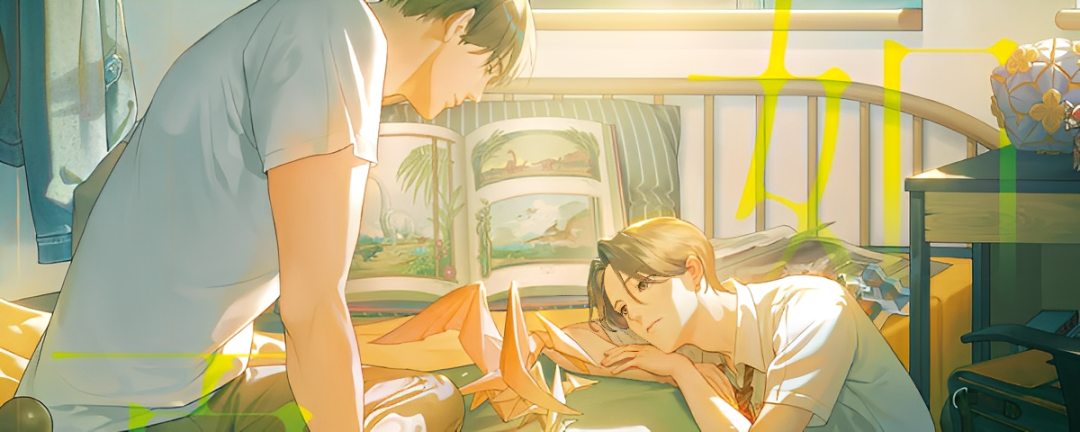BOSF 001: Born Toward the Sun
by cloudies“Retard, Xiang Yang is a retard—”
With a “thud,” a small stone struck the person squatting under the low wall. Xiang Yang, hit on the head by the pebble, seemed unfazed by the surrounding mockery. He kept his head down, staring at a group of ants marching in formation on the ground. After a moment, as if just noticing the pain, he touched his head but still didn’t glance at the two children bullying him—not even once, despite being taller and larger than them if he stood up.
The two brats showed no fear of Xiang Yang. They stepped closer, pointing at his reaction and laughing exaggeratedly: “Hahaha… hahaha…”
Ji Yan, on his way home, witnessed the scene and feigned anger: “Hey—”
The two kids turned, saw Ji Yan, and showed no guilt for their actions. Instead, they ran off giggling, shouting as they went: “Xiang Yang’s an idiot, a stupid retard—”
Ji Yan sighed heavily as he watched the kids disappear. He shifted his gaze to Xiang Yang, who maintained the same posture, seemingly indifferent to what had just happened.
They lived in the same old apartment building, with Xiang Yang’s family right across from Ji Yan’s. This wasn’t the first time Xiang Yang had been bullied by kids younger than him. The reason was simple: Xiang Yang’s unusual behavior. He had congenital autism, also known as Asperger’s syndrome.
In this conservative rural village, populated mostly by the elderly and children, education levels were generally low. Most people didn’t understand mental disorders; they only knew such individuals had “something wrong with their brains” and weren’t “normal.” Xiang Yang was lumped into this category—neither overtly discriminated against nor treated kindly. Even when kids bullied him, adults turned a blind eye, dismissing it as childish play, nothing out of the ordinary.
Initially, Ji Yan’s interest in autism stemmed from curiosity, prompting him to research it. He knew Xiang Yang’s intelligence was likely fine; it was his ability to express himself that was impaired.
He crouched down in front of Xiang Yang, knowing he wouldn’t get a response but asking anyway: “What’s so interesting about ants?”
As expected, Xiang Yang ignored him, fixated on the ground. His face held a calm, serene expression, oblivious to the surrounding noise, immersed in his own world as if nothing could disturb him.
Even crouching, Ji Yan was shorter than Xiang Yang; standing, he wasn’t much taller either. They were the same age, thirteen, just starting junior high, and today was the first day of school. Both wore short-sleeved summer uniforms—white shirts with dark blue pants, a dated and plain color scheme.
Yet, the difference between twelve and thirteen marked a shift from childishness to the cusp of young adulthood.
To outsiders, they were still just kids. But at this age, children have a strong sense of self, sensitive hearts, and maturing values, forming their own ways of seeing the world. Even Ji Yan, often called a “good kid,” had his own thoughts.
“Xiang Yang.”
A sudden female voice broke the silence from nearby. A middle-aged woman, resembling Xiang Yang, approached from the apartment entrance. She grabbed him and scolded, “Who told you to wander off? Get back home—”
She knew Xiang Yang wouldn’t respond or obey, so she immediately yanked him up. Even standing, Xiang Yang was nearly her height, but he remained unresponsive to her rough treatment.
Ji Yan stood up as well, politely saying, “Auntie.”
Xiang Yang’s mother gave Ji Yan a forced smile. The forty-something woman wore makeup, and traces of her youthful beauty were still visible. Without exchanging pleasantries, she hurriedly pulled Xiang Yang away, as if worried he’d embarrass her outside and needed to be hidden at home. Having a son like him clearly weighed heavily on her, as she often faced judgmental whispers and strange looks from others.
At school, Ji Yan had been taught to help the disadvantaged, care for vulnerable groups, avoid discrimination, and treat everyone equally.
He remembered how his classmates nodded in agreement when the teacher preached these values, as if they truly understood. But in this closed, conservative community, it was the adults—supposedly mature—who set a poor example, leading children to follow suit.
Given Xiang Yang’s condition, he shouldn’t have been attending a regular school. Special education would have given him room to learn and grow. But his parents treated him like a typical child, unable to accept that their son was different. They frequently scolded or hit him, as if he were disobedient, to show the neighbors they were still disciplining him, fulfilling their parental duties.
Xiang Yang, born toward the sun. It was a name filled with hope and parental expectations. But everything changed when he was diagnosed with autism at age five.
At his age, Ji Yan already understood the harshness of reality and felt a disconnect between his beliefs and the world around him.
During dinner, as Ji Yan’s family sat at the table, the sound of Xiang Yang’s parents arguing drifted from across the hall. The apartment’s thin walls offered little soundproofing, and their words were crystal clear to Ji Yan’s family.
“You gave birth to this son, so why don’t you discipline him properly? Don’t let him wander outside—it’s embarrassing!”
“Doesn’t he have a father? You’re out all day and don’t care about anything at home!”
“I’m out there earning money to support this family!”
“You’re right, you’re always right. It’s all my fault… sob sob sob…”
The argument, as always, ended with the woman’s cries. Ji Yan’s family had grown used to it. Ji Yan listened in silence, while his parents occasionally commented.
Ji Qiuyuan, as a father, saw it from the parents’ perspective: “It’s not easy for that couple, having a child like that…”
Ji Yan frowned, knowing his father meant no harm but feeling uneasy. Was it wrong to have a child like Xiang Yang? It’s not like he chose to be this way.
But Ji Yan knew that if he argued, his parents would lecture him threefold, pulling out the “we raised you, so we can discipline you” line. His parents were ordinary—neither particularly good nor bad, not highly educated. They gossiped about others, shared their opinions as if they were always right, and expected their child to obey.
Growing up in such an ordinary family only deepened Ji Yan’s sense of powerlessness.
His mother, Lin Yueqin, chimed in: “Xiang Yang’s a pitiful kid. I heard from the neighbors… they might be planning to have another child.”
“Really?” Ji Qiuyuan pondered, then added, “That might be good. Maybe they’ll stop fighting then.”
Ordinary families focus on their own lives, rarely meddling in others’ affairs—a common trait. But Ji Yan wondered: if Xiang Yang had a younger sibling, what would happen to him? Things would probably get even worse for him.


0 Comments